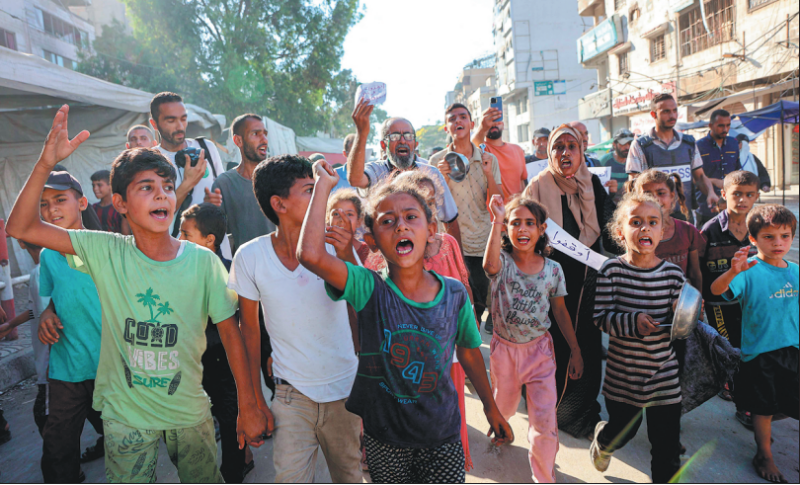
Demonstrators and journalists march in a protest against hunger in Gaza City. The World Food Programme said nearly one in three people in Gaza were not eating for days at a stretch and "thousands" were "on the verge of catastrophic hunger". OMAR AL-QATTAA/AFP
The Gaza conflict shows no signs of ending even after 21 months. Israel's continued military offensives and weaponization of famine in the Palestinian enclave have caused heavy civilian casualties and suffering. More than 58,000 people have been killed and an unprecedented humanitarian disaster is worsening by the day.
Israel says it is committed to allowing aid into Gaza, but must control it to prevent it from being diverted by militants. It says it has let enough food into Gaza, but the truth is a humanitarian crisis is unfolding in Gaza under its control.
The blockade preventing aid entering the Palestinian enclave is causing mass starvation, World Health Organization chief Tedros Adhanom Ghebreyesus said on Wednesday.
"I don't know what you would call it other than mass starvation, and it's man-made, and that's very clear," Tedros told a virtual news conference livestreamed from Geneva. "This is because of (the) blockade."
At least 875 people have been killed in Gaza while trying to get food aid in recent weeks, according to the United Nations.
In July alone, 5,100 children have been admitted to malnutrition programmes, including 800 who were severely emaciated, said Rik Peeperkorn, the WHO's representative for the occupied Palestinian territories.
Despite Israel's efforts to pass the buck to Hamas, the international community sees clearly Tel Aviv's relentless military operations have gone far beyond justifiable retaliation for Hamas' attacks on Israel on Oct 7, 2023. They have become a forced eviction of the Palestinians from Gaza and an important part of the Benjamin Netanyahu government's tactics to remain in power.
Twenty-eight nations, including some major Western countries, released a joint statement this week calling for an immediate end to the war in Gaza, accusing Israel of not allowing sufficient aid in, and demanding it must do so to comply with international humanitarian law.
"The suffering of civilians in Gaza has reached new depths. The Israeli government's aid delivery model is dangerous, fuels instability and deprives Gazans of human dignity....Israel must comply with its obligations under international humanitarian law," the statement said.
As predicted, Tel Aviv chose to blame everything on Hamas again and criticized the countries issuing the statement, saying they miss the point.
Oren Marmorstein, a spokesperson for the Israel Ministry of Foreign Affairs, said on social media the statement is "disconnected from reality and sends the wrong message to Hamas", adding "All statements and all claims should be directed at the only party responsible for the lack of a deal for the release of hostages and a ceasefire: Hamas, which started this war and is prolonging it".
But it is Israel that took the initiative to end, by force, the previous three-phase ceasefire process brokered by the United States. It is also Israel that has been ardently seeking to expand the conflict from Gaza to other regions in the Middle East that are not controlled by Hamas.
Since the beginning of this year, Israeli settlement expansion and settler violence have killed more than 600 Palestinians and injured more than 5,000. Israel should stop its attacks on the West Bank, and effectively curb settler violence.
Israel also continues to attack Syria and Lebanon, maintains an illegal military presence, and exacerbates tensions, which infringe upon the sovereignty, security and territorial integrity of the two countries.
As Fu Cong, China's permanent representative to the United Nations, said at a UN Security Council open debate on the Middle East situation on Wednesday, the international community must resolutely reject unilateral actions that erode the foundation of the "two-state solution" and resolutely oppose dangerous attempts to annex Gaza and the West Bank.
The Middle East cannot always be under the shadow of conflict, and the people of the region cannot continue to live in the insecurity of war. The Palestine question is the core of the Middle East issue, and the implementation of the "two-state solution "is the only viable way out of the Palestine question.
China welcomes the UN Security Council high-level meeting on the implementation of the "two-state solution" next week, and looks forward to the meeting injecting strong impetus into the implementation of the "two-state solution".





